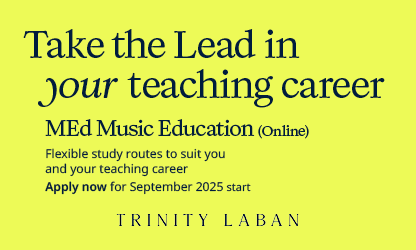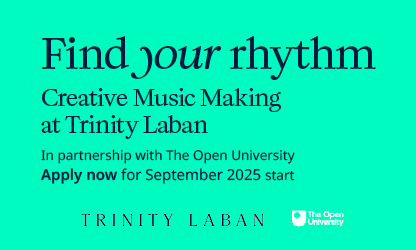Music education – Building skills for professional life
The results from our August 2025 survey of leisure-time musicians show that the transferable skills they learned from studying music at school have been well used in their professional life as well as giving them access to lifelong involvement in music-making.
At Making Music, we know our members highly value the music education they receive, that has led them to a lifelong involvement in music-making and brought them so many benefits. But they are also concerned, as we are, that fewer children are now able to access music at school, and they don’t get the first introduction and basic education they need to become lifelong participants. So we’ve been supporting the Association of British Orchestra’s campaign on music education #AnOrchestraInEverySchool — a national call to ensure access to high-quality music education and creative subjects for all children and young people, investing in music education and skills development.
In August, to support the campaign, Making Music surveyed members of member groups and other leisure-time musicians, to find out what impact learning music had on their professional life. We hoped to show that learning a musical instrument or to sing at school, as well as learning about music and being exposed to live music, taught young people many skills that benefitted them whatever professional route they then decided upon.
We had a great response, with almost 1,000 leisure-time musicians telling us what high value they placed on their music education. Only 8% of respondents told us their music learning was not useful in their chosen profession, and 28% of respondents told us that they had used these transferable skills in a STEM job (Science, Technology, Engineering, and Mathematics). As well as the stats we gathered, we collected some amazing snapshot stories, as respondents told us what an important role their music learning had played in developing the skills they needed in professional life:
'Participating in musical groups and learning to perform in front of audiences has directly assisted in making me confident speaking in meetings, with clients and leading presentations.'
'Music helped provide me with transferable skills usable within my mathematics degree, but many others going beyond — without it I would never have transferred to law and succeeded at the bar.'
'Playing in an orchestra or group is a great template for teamwork — as an individual you face huge technical challenges, but you need great awareness of how you fit into the overall team and what you are trying to achieve musically.'
We found the responses to the survey fascinating, and we think we’ll find lots of uses for this data. We’re publishing an extract here so our members and others with an interest in the leisure time music sector can have a look. If you think it would be useful for any of your own purposes, please do use, with reference to Making Music of course!
The responses
The survey was circulated to members of Making Music member groups, but was open to anyone to complete. It was targeted at adults who play music or sing as a leisure-time activity and who were taught to sing or play at school, or at school age. The survey was particularly designed for people who did not go on to work as musicians or in the professional music sector. A total of 953 people responded.
What is your current or last job?
A wide variety of professions were represented in these responses, including Astrophysicists, Barristers, Accountants, Journalists, Aeronautical Engineers, Nurses, and Vicars. The most common job titles were Teacher, Solicitor, Doctor and University Lecturer.
What professional area have you mostly worked in?
The top sectors represented were:
- Education - 21%
- Healthcare - 14%
- Music - 9%
- Technology and IT - 8%
- Business administration and management - 7%
- Science and mathematics - 6%
- Financial services - 6%
- Engineering, building and construction - 4%
- Law - 4%
What music education did you have access to at school?
- I played in an orchestra / band / other ensemble - 80 %
- I was taught to sing / sang in a choir - 75 %
- I was taught to play an instrument - one to one / advanced lessons - 73%
- I was taught to read sheet music - 71%
- I was taught music theory - 66%
- I was presented for graded instrumental exams - ABRSM/Trinity etc - 63%
- I was taught to play an instrument – in a group / basics lessons - 44%
- I had no instrumental/singing teaching/ no access to music education at school– 5%
- I was taught music technology - digital music, audio engineering etc - 4%
Up to what level at school did you receive music education?
- At secondary school / college as an advanced assessed subject - 38 %
- At secondary school - but not as an assessed subject - 32%
- At secondary school as an assessed subject - 26%
- At primary school - 2 %
- I had no access to music education at school, I was only taught out of school -1%
What year did you leave school?
- 1950 to 1959 – 5%
- 1960 to 1969 – 19%
- 1970 to 1979 - 30%
- 1980 to 1989 – 20%
- 1990 to 1999 – 13%
- 2000 to 2009 – 8%
- 2010 to 2019 – 4%
Which of these transferable skills would you say were improved by playing and learning music at school age?
- Practise and perseverance - 90%
- Focus and concentration - 88 %
- Listening and auditory skills - 86 %
- Team work and collaboration - 85 %
- Performance and presentation - 77%
- Reliability and responsibility - 71%
- Memorisation - 53%
- Creativity and improvisation - 49%
- Language and code reading - 33%
- Use of IT and other technology - 6%
What impact has playing and learning music at school age had on your working life?
- I’ve used these transferable skills in my work (not a music related or STEM profession) - 50%
- I’ve used these transferable skills in my work in a STEM profession (Science, Technology, Engineering, and Mathematics) - 28 %
- I've used music learning directly – I have worked as a musician/in the music industry/related industry - 20%
- I've used music learning in another profession - e.g. a teacher who plays piano in class, a film editor who reads music scores - 18 %
- The learning and skills were not useful in my chosen profession - 8%
How have you been involved with music in your leisure time i.e. not in your working life?
- I’m a member of an orchestra / band / ensemble - 79%
- I listen to music / watch concerts on TV etc at home - 79%
- I regularly go to concerts - 72%
- I play at home for fun / relaxation - 68%
- I perform for an audience (formal or informal events) - 64%
- Other involvement with music? - 29%
- I teach / lead groups (voluntarily, unpaid) - 19%
- I compose / arrange music - 16%
- I have not been involved with music at all since I left school - 0%
Find out more about the campaign including details on how you can get involved, and protect music education for generations to come: #AnOrchestraInEverySchool



